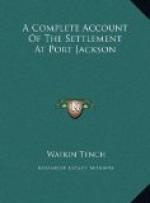had ceased to suck and afterwards were reared by us.
In what space of time it reaches such a growth as
to be abandoned entirely by the mother, we are ignorant.
It is born blind, totally bald, the orifice of the
ear closed and only just the centre of the mouth open,
but a black score, denoting what is hereafter to form
the dimension of the mouth, is marked very distinctly
on each side of the opening. At its birth, the
kangaroo (notwithstanding it weighs when full grown
200 pounds) is not so large as a half-grown mouse.
I brought some with me to England even less, which
I took from the pouches of the old ones. This
phenomenon is so striking and so contrary to the general
laws of nature, that an opinion has been started that
the animal is brought forth not by the pudenda, but
descends from the belly into the pouch by one of the
teats, which are there deposited. On this difficulty
as I can throw no light, I shall hazard no conjecture.
It may, however, be necessary to observe that the
teats are several inches long and capable of great
dilatation. And here I beg leave to correct an
error which crept into my former publication wherein
I asserted that, “the teats of the kangaroo
never exceed two in number.” They sometimes,
though rarely, amount to four. There is great
reason to believe that they are slow of growth and
live many years. This animal has a clavicle,
or collar-bone, similar to that of the human body.
The general colour of the kangaroo is very like that
of the ass, but varieties exist. Its shape and
figure are well known by the plates which have been
given of it. The elegance of the ear is particularly
deserving of admiration. This far exceeds the
ear of the hare in quickness of sense and is so flexible
as to admit of being turned by the animal nearly quite
round the head, doubtless for the purpose of informing
the creature of the approach of its enemies, as it
is of a timid nature, and poorly furnished with means
of defence; though when compelled to resist, it tears
furiously with its forepaws, and strikes forward very
hard with its hind legs. Notwithstanding its
unfavourable conformation for such a purpose, its
swims strongly; but never takes to the water unless
so hard pressed by its pursuers as to be left without
all other refuge. The noise they make is a faint
bleat, querulous, but not easy to describe. They
are sociable animals and unite in droves, sometimes
to the number of fifty or sixty together; when they
are seen playful and feeding on grass, which alone
forms their food. At such time they move gently
about like all other quadrupeds, on all fours; but
at the slightest noise they spring up on their hind
legs and sit erect, listening to what it may proceed
from, and if it increases they bound off on those
legs only, the fore ones at the same time being carried
close to the breast like the paws of a monkey; and
the tail stretched out, acts as a rudder on a ship.
In drinking, the kangaroo laps. It is remarkable
that they are never found in a fat state, being invariably
lean. Of the flesh we always eat with avidity,
but in Europe it would not be reckoned a delicacy.
A rank flavour forms the principal objection to it.
The tail is accounted the most delicious part, when
stewed.




